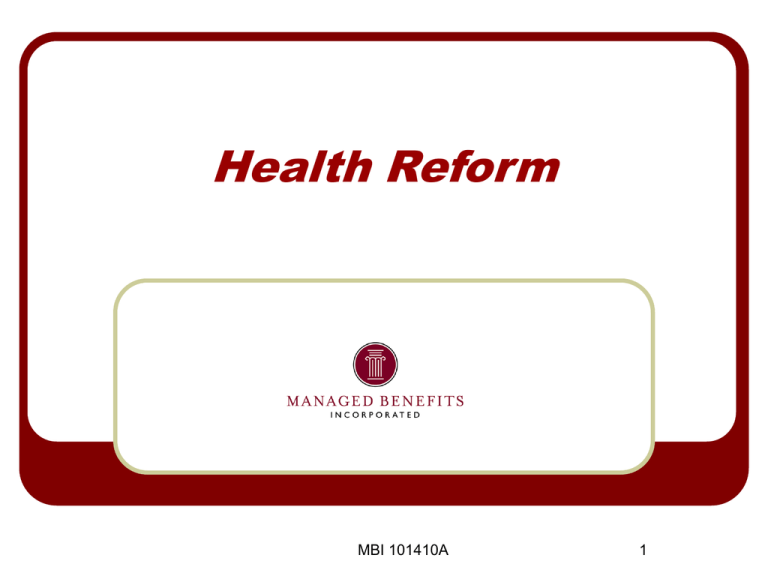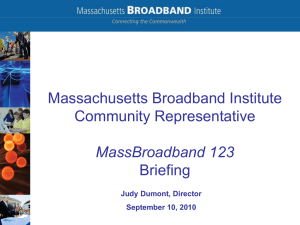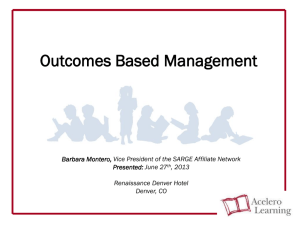GrandFathered Health Plans
advertisement

Health Reform MBI 101410A 1 Summary This presentation will introduce you to the pressing issues concerning the Patient Protection and Affordable Care Act signed into law March 2010 Our goal is to help you better understand the impact this will have on you and your business, and to let you know how we may be able to assist you Information in this presentation is not considered exhaustive nor is it considered legal advice MBI 101410A 2 Currently On-going Grandfathered Health Plans Employer Subsides of Medicare D Minimum Loss Ratios Adoption Coverage Breaks for Nursing Mothers MBI 101410A 3 Grandfathered Health Plans Overview A grandfathered health plan is any plan in which at least one individual was enrolled on March 23, 2010, and the policy or plan must have continuously covered someone since that date. Grandfathered plans remain subject to: Mental Health Parity provisions Newborns’ and Mother’s Health Protection Act provisions Women’s Health and Cancer Rights Act Michelle’s Law If an employer offers multiple health plan options, each option is treated separately in terms of its grandfathered status Grandfathered plan rules are not limited to individuals enrolled on the date of enactment but rather • • New employees (and their families) may be covered under an employer’s grandfathered plan Family members of current employees who are covered by the grandfathered plan may also be added, if their enrollment was permitted under plan terms on March 23, 2010 MBI 101410A 4 Grandfathered health plans are exempt from various provisions of the health reform law, including: • • • • • • • Coverage of preventive services without cost-sharing Cost-sharing limits Insured group health plan nondiscrimination rules Claims appeals and review process Selection of doctors and referral requirements Coverage of clinical trials No discrimination against providers In addition, an exception is made for employers that have scheduled plan changes as a result of a collective bargaining agreement MBI 101410A 5 Keeping Grandfathered Status Individuals and employer group plans that wish to keep their current policy on a grandfathered basis would only be able to do so if the only plan changes made were to add or delete new employees and any new dependents. Regulation allows for changes in plan benefit structure, except for the following: • Eliminating all or substantially all benefits to diagnose or treat a particular condition • Increasing a coinsurance or other percentage-based cost-sharing requirement above the level in effect on March 23, 2010 • Increasing a fixed-dollar cost-sharing requirement, such as annual deductible or out-of-pocket limit, by total percentage – measured from march 23, 2010 – that exceeds the sum of the medical inflation rate plus 15% points • Increasing co-payment by an amount exceeding greater of • The amount just described for other fixed-amount cost-sharing requirements • $5 increased by the medical inflation rate since March 23, 2010. • Decreasing rate of employer contributions to the plan (for any tier, such as employee-only or family) by more than 5% points below rate that was effect on March 23, 2010 • Adopting or decreasing an annual benefit limit, with the specific rules depending on whether the plan had already imposed an annual or lifetime limit as of March 23, 2010 MBI 101410A 6 Provisions applicable to all group health plans as of the law’s relevant effect date, regardless of “grandfathered” status, include: • • • • • • Coverage of adult children up to age 26 (grandfathered group health plans do not have to comply with this requirement until the first plan year beginning on or after January 1, 2014, if the adult child is eligible for coverage under another eligible employer-sponsored health plan) Lifetime/annual limit restrictions Rescission restrictions Preexisting condition exclusions 90-days waiting period limit Uniform summary of benefits MBI 101410A 7 Keeping Grandfathered Status As of now, other types of benefit modifications will not cause a loss of grandfathered status. • Example: the regulation’s preamble asks for comments on whether changing a plan’s network provider, changing from an insured to a self-funded plan, or changing a prescription drug formulary should be added as events causing a loss of grandfathered status. The preamble assures us that any such change in the regulation would be applied only prospectively The regulations provide that the grandfathering rules apply separately to each “benefit package” made available under a health plan. Thus, a plan offering both an HMO and PPO option might choose to modify the PPO’s deductible or co-payment in a way that would cause the PPO to lose its grandfathered status, without thereby forfeiting the HMO’s grandfathered status. MBI 101410A 8 Keeping Grandfathered Status Implies that, beginning in 2014, premiums can vary more widely for grandfathered plans than for non-grandfathered plans for employers with up to 100 employees Plan sponsors that have decided to maintain grandfathered status must provide participants with a statement that the plan intends to preserve the basic health coverage that was in effect on March 23, 2010, and that some of the consumer protections of the Act may not apply. In addition, to maintain status as a grandfathered plan, the plan sponsor must retain records of the plan terms in existence on March 23, 2010, including plan documents, insurance policies, summary plan descriptions (SPDs), and other cost-sharing documentation. MBI 101410A 9 Grandfathered Provision: Transition Rules For plans that made changes prior to March 23, 2010 (even if they take effect after March 23, 2010), grandfather status is retained if such changes were adopted pursuant to a legally binding contract, insurance filing, or written plan amendment. For plans that made routine changes between March 23, 2010 and June 17, 2010, a good faith compliance standard will be applied and any changes that only modestly exceed any grandfather requirements will be allowed for the current plan year. The good faith standard has been extended until July 1, 2011 For plans that made significant changes prior to June 17, 2010 that would cause them to lose grandfathered status are allowed a grace period lasting until the start of the next plan year beginning after September 23, 2010 to bring their coverage terms in compliance with PPACA. MBI 101410A 10 Grandfathered Plan Summary Chart Summary of 2010-2014 changes (see handout) MBI 101410A 11 Employer Subsidies of Medicare Part D Premiums Eliminates the deduction for the subsidy to employers who maintain prescription drug plans for their Medicare Part D eligible retirees. In order for coverage to be available under this part for covered part D drugs of a manufacturer, the manufacturer must: • • Participate in the Medicare coverage gap discount program under section 1860D-14A Have entered into and have in effect an agreement described in subsection (b) of such section with the Secretary MBI 101410A 12 • Have entered into and have in effect, under terms and conditions specified by the Secretary, entered into a contract with under subsection (d)(3) of such section: • (b) Effective date – shall apply to covered part D drugs • (c) Authorizing coverage for drugs not covered under agreement - subsection (a) shall not apply to the dispensing of a covered part D drug if: • • The Secretary has made a determination that the availability of the drug is essential to the health of beneficiaries under this part; or The Secretary determines that in the period beginning on July 1, 2010, and ending on December 31, 2010, there were extenuating circumstances. MBI 101410A 13 Minimum Loss Ratios Health plans, including “grandfathered plans”, must annually report on the share of premium dollars spent on medical care and provide consumer rebates for excessive medical loss ratios. (regulatory process starts 2010) • Applies to “issuers” not employers directly • Administered by the HHS • States are permitted to set higher MLR standards • Self insured plans are exempt The amendment made by this section shall apply to taxable years beginning after December 31, 2009 MBI 101410A 14 The minimum loss ratios are as follows: • 85% for large group plans (101 or more employees) • 80% for small group plans (100 or less employees) • 80% for individual plans Carriers must issue rebates to each enrollee on a pro rata basis for plans that that fail to meet MLR requirements starting in 2011. By December 31, 2010, the NAIC is required to establish: • Uniform definitions • Standard MLR calculation methodology • Rebate calculation methodology MBI 101410A 15 Adoption Coverage Limit for employer sponsored assistance for adoptions increase from $10,000 to $13,170 Employee may exclude QAE from gross income that is reimbursed under employer provided program Credit is extended through 2011 Phased out for high income earners starting at $182,000 Tax payer may file an amendment to claim credit for QAE for 2008 and 2009 MBI 101410A 16 Breaks for Nursing Mothers All employers with 50 or more employees to provide private areas (not restrooms) where mothers of children less than one year old can pump breast milk in private Employers must provide “reasonable” unpaid time for this Smaller employers may be exempted if undue hardship can be demonstrated MBI 101410A 17 Health Reform 2010 MBI 101410A 18 Summary Non-Discrimination Testing Early Retiree Re-insurance Pre-existing Conditions Increase in Dependent Coverage OBGYN Non Referral Provision Coverage of Preventive Care Coverage Appeals Process MBI 101410A 19 Summary Wellness Grants Tanning Tax HSA and MSA Tax Emergency Service Coverage Designation of Primary Care Doctor Web Based Information Portal MBI 101410A 20 Non-Discrimination Testing Requires all group health plans to comply with current IRC § 105(h)(2) rules that prohibit discrimination in favor of highly compensated individuals in terms of eligibility and benefits. All non-Grandfathered plans must pass discrimination testing similar but not exactly like other cafeteria plans. Under the new nondiscrimination rules, fully insured group health plan need to meet these requirements: • It cannot discriminate in favor of highly compensated individuals • It must demonstrate that it benefits at least 70% of all employees • It cannot discriminate in favor of participants who are highly compensated individuals MBI 101410A 21 Non-Discrimination Testing Penalties for Non-Compliance $100 per day for each employee whose benefits are not in compliance capped at 10% of the cost of the group health plan or $500,000 which ever is less. MBI 101410A 22 Early Retiree Re-insurance Program Creates a new temporary reinsurance program to help companies (including self-funded plans) that provide early retiree health benefits for those ages 55-64 offset the cost of that coverage. Employers must apply to the HHS in order to participate in this program. The federal government will allocate $5 billion toward the creation of a temporary reinsurance program for employersponsored early retiree coverage that will reimburse 80% of claims between $15,000 and $90,000. The purpose of the program is to encourage employers that currently offer retiree medical coverage to continue to do so until the Exchanges are up and running. MBI 101410A 23 Cumulative health benefits incurred in a given plan year and paid for a particular early retiree that fall between those amounts will be eligible for reimbursement (rather than reimbursement being made only for discrete health benefit items or services whose reimbursement total falls between those amounts). Reimbursement will be made only for claims that are incurred during the applicable plan year, and paid. Thus, eligible employers can save up to $60,000 per early retiree each year. Eligible claims are those for individuals at least age 55 (and their dependents) who are not eligible for Medicare and are not active workers. • • • Includes documented retiree cost-sharing (deductibles, copays, coinsurance, etc.) Includes medical and prescription drug claims. Excludes HIPAA-excepted benefits (e.g., long-term care and limited scope dental or vision benefits). MBI 101410A 24 Eligible plans must apply for the program and meet minimum requirements for management of participants with chronic and highcost conditions. Reinsurance payments received by employers must be used to reduce participant and/or sponsor costs. A sponsor must be able to explain how reimbursements will be applied to maintain its level of effort in contributing to support the plan. Reimbursements are not treated as taxable income to the employer. The program is effective June 1, 2010, and ends January 1, 2014, or sooner, if funds are depleted. Sponsors may apply for plan years that begin before June 1, 2010, but end after that date. In that case, the amount of claims incurred before June 1, 2010 (up to $15,000) count toward the $15,000 cost threshold and the $90,000 cost limit. The amount of claims incurred before June 1, 2010, in excess of $15,000 is not eligible for reimbursement and does not count toward the cost limit. The reinsurance amount to be paid is based solely on claims incurred on and after June 1, 2010, and that fall between the cost threshold and cost limit for the plan year. MBI 101410A 25 Pre-Existing Condition Coverage for Individual Market Federal High Risk Pool for Individuals with a Pre-Existing Condition (June 2010) • Provides eligible individuals access to coverage that does not impose any coverage exclusions for pre-existing health condition. This provision ends when Exchanges are operational. • • • • • • May be administered by nonprofit organizations under contract from HHS. No preexisting condition limitations Plan must cover at least 65% of medical costs Limitation on total out of pocket expenses Rates based upon a standard population with age rating factor max of 4:1 Eligibility: • Legal resident of the United States • No creditable coverage six months prior to March 23, 2010 or the date on which they apply for coverage under the pool • Has preexisting condition, as determined in a manner consistent with guidance issued by Secretary. • Health plans and employers must reimburse the program if they have discouraged individuals from being enrolled based on health status. • 5 billion dollars appropriated to pay claims in excess of premiums. MBI 101410A 26 As of 10/5/10, most health insurance carriers in the state of VA have voluntarily removed themselves from offering health insurance for children under the age of 19 for child only policies. Many carriers will still write policies assuming there is at least 1 adult on the policy. MBI 101410A 27 Eliminating Pre-Existing Conditions Exclusion for Children Bars health insurance companies from imposing pre-existing condition exclusions on children less than 19 years of age (October 2010) MBI 101410A 28 Increases in Dependent Coverage Increases the age of a dependent (regardless of status regarding marriage, full-time student, place of residence, or financial dependency) for health plan coverage until the age of 26 (coverage is not provided on the dependent’s 26th birthday) for: Fully insured individual health plans Fully insured group plans Self Insured group health plans COBRA coverage Dependent children include: son/daughter; stepchildren; adopted children; foster children. MBI 101410A 29 If child is eligible under these rules, and parent not currently covered, the parent must be allowed to enroll or switch to another plan. For grandfathered plans until 2014, they only have to offer to those dependents NOT eligible for other source of employer sponsored coverage. Transition rules say a plan or issuer must provide a written notice to enroll within 30 days. Nothing in this section shall be construed to modify the definition of ‘dependent’ as used in the Internal Revenue Code of 1986 with respect to the tax treatment of the cost of coverage. MBI 101410A 30 This provision generally is effective for the first plan year beginning on or after September 23, 2010 (i.e., January 1, 2011, for calendar year plans), although collectively bargained plans may have a later effective date. Until the first plan year beginning on or after January 1, 2014, grandfathered group health plans are not required to extend coverage to adult children (up to age 26) who have access to another eligible employer-sponsored health plan (a group health plan or group health insurance coverage which is a governmental plan, or any other plan or coverage offered in the small or large group market within a State). MBI 101410A 31 OBGYN Non Referral Provision General Rights • Direct Access- A group health plan, or health insurance issuer offering group or individual health insurance coverage, described in paragraph (2) may not require authorization or referral by the plan, issuer, or any person including a primary care provider described in paragraph(2)(B)) in the case of a female participant, beneficiary, or enrollee who seeks coverage for obstetrical or gynecological care provided by a participating health care professional who specializes in obstetrics or gynecology. Such professional shall agree to otherwise adhere to such plan's or issuer’s policies and procedures, including procedures regarding referrals and obtaining prior authorization and providing services pursuant to a treatment plan (if any) approved by the plan or issuer. MBI 101410A 32 • ‘‘(B) OBSTETRICAL AND GYNECOLOGICAL CARE.—A group health plan or health insurance issuer described in paragraph(2) shall treat the provision of obstetrical and gynecological care, and the ordering of related obstetrical and gynecological items and services, pursuant to the direct access described under subparagraph (A), by a participating health care professional who specializes in obstetrics or gynecology as the authorization of the primary care provider. MBI 101410A 33 Coverage of Preventive Care In general – a group health plan and a health insurance issuer offering group or individual health insurance coverage shall, at a minimum provide coverage for and shall not impose any cost sharing requirements for: • 1. Evidence-based items or services that have an effect a rating of ‘A’ or ‘B’ in the current recommendations of the United States Preventive Service Task Force; (See handout) MBI 101410A 34 Update as of August 1, 2010 Be sure preventive service is separate from an office visit unless purpose of the visit is preventive in nature In-network ONLY All new group health plans and plans in the individual market must provide first dollar coverage for preventive services • This provision appears to eliminate deductibles or other cost sharing mechanisms for preventative care MBI 101410A 35 Coverage Appeals Process Update as of July 2010 Requires that any new group health plan or new plan in the individual market implement an effective appeals process for coverage determinations and claims. • (Update as of July 23, 2010): Under new rules, nongrandfathered heath plans must implement an internal appeals process for denied claims that conforms to new requirements which are MORE RIGOUROUS than those currently required under ERISA. Furthermore, plans must allow for an external appeals process to be utilized in the event that the internal appeal does not yield a favorable result for the participant. MBI 101410A 36 Coverage Appeals Process (Internal Claims Appeal) A group health plan and the health insurance issuer offering group and individual health insurance coverage shall implement an effective appeals process for appeals of coverage determinations and claims for: • • • • 1- determination of an individual’s eligibility to participate in a plan 2- determination that a benefit is not a covered benefit 3- Imposition of a preexisting condition exclusion on otherwise covered benefit 4- determination that a benefit is experimental, investigational or not medically necessary MBI 101410A 37 Coverage Appeals Process (Internal Claims Appeal) Plan or insurer must notify claimant of benefit determination not later than 24 hours (if urgent care is involved) Claimant must be provided with new evidence considered, rationale, notice to enrollees, impartiality of personal involved making the decision and reason(s) for final determination. Continued coverage will be provided during internal review process. MBI 101410A 38 Coverage Appeals Process (External Appeal Process) State or Federal external review can be filed within four months of adverse internal claims review determination During external appeals process, the following will be considered: • Medical records, health professional’s recommendation, terms of coverage, appropriate practice guidelines, documents from health carrier Within 45 days, written decision of determination will be provided MBI 101410A 39 Wellness Grants The Secretary shall award grants to eligible employers to provide their employees with access to comprehensive workplace wellness programs. The grant program established under this section shall be conducted for a 5-year period. The term “eligible employer” means an employer (including a non-profit employer) that: • • A. employs less than 100 employees who work 25 hours or greater per week B. does not provide a workplace wellness program as of the date of enactment of this Act. MBI 101410A 40 An eligible employer desiring to participate in the grant program under this section shall submit an application to the Secretary, in such manner and containing such information as the Secretary may require, which shall include a proposal for a comprehensive workplace wellness program that meet the criteria and requirements. For purposes of carrying out the grand program under this section, there is authorized to be appropriated $ 200,000,000 for the period of fiscal years 2011-2015. Amounts appropriated pursuant to this subsection shall remain available until expended. MBI 101410A 41 Tanning Tax To help pay for the plan, a 10% tax on indoor tanning service Began July 2010 MBI 101410A 42 HSA and MSA Tax Increases Increases the additional tax for HSA withdrawals prior to age 65 that are not used for qualified medical expenses from 10 to 20 percent. The additional tax for Archer MSA withdrawals not used for qualified medical expenses would increase from 15 to 20 percent. HSAs- Section 223(f)(4)(A) of the Internal Revenue Code of 1986 is amended by striking “10 percent” and inserting “20 percent”. Archer MSAs- Section 220 (f)(4)(A) of the Internal Revenue Code of 1986 is amended by striking “15 percent” and inserting “20 percent”. Effective Date- The amendments made by this section shall apply to distributions made after December 31, 2010. MBI 101410A 43 Emergency Services Coverage Mandates coverage of emergency services at in-network level regardless of provider for: • Fully-insured individual health plans • Fully-insured group plans • Self-insured group health plans Carriers only have to pay the provider at the greater level of: • Amount you would have paid in network • The insurance carrier’s normal reasonable and customary level • Medicare Patients can be balance billed MBI 101410A 44 Designation of Medical Provider as a Primary Doctor Allows for designation of any participating primary care doctor or pediatrician as primary care doctor No preauthorization or referral necessary for OB/GYN services MBI 101410A 45 Web-Based Portal Update as of July 2010 Immediate establishment – not later than July 1, 2010, the Secretary, In consultation with the States, shall establish a mechanism, including an Internet website, through which a resident of any state may identify affordable health insurance coverage options in that State. www.healthcare.gov MBI 101410A 46 MBI 101410A 47 Connecting to affordable coverage- An Internet website established under paragraph (1) shall, to the extent practical, provide ways for residents of any States to receive information on at least the following coverage option: • • • • • Health insurance coverage offered by health insurance issuers, other than coverage that provides reimbursement only for the treatment or mitigation Medicaid coverage under title XIX of the Social security Act. Coverage under title XXI of the Social Security A State health benefits high risk pool, to the extent that such high risk pool is offered in such State; and Coverage under a high risk pool under section 1101. MBI 101410A 48 Health Reform 2011 MBI 101410A 49 Summary Reporting on W-2’s Qualified Medical Expenses Cafeteria Plan Safe Harbor Non-Retaliation Provision CLASS Act MBI 101410A 50 Reporting on W-2’s Employers must include on annual Forms W-2 the aggregate cost of group health plan benefits (excluding FSA, HSA, or Archer MSA contributions, or the cost of long term care, and certain other excepted benefits) provided to employees for taxable years beginning on or after January 1, 2012 (i.e., Forms W-2 issued in 2013 for 2012 wages, and issued thereafter for subsequent years). Employers can calculate the reportable value based on a methodology similar to that used under COBRA (minus the 2% COBRA administrative fee, if charged). If the plan provides for the same COBRA continuation coverage premium for both individual coverage and family coverage, the plan would be required to calculate separate individual and family premiums for this purpose. MBI 101410A 51 Qualified Medical Expenses Standardizing the Definition of Qualified Medical Expenses. • Conforms the definition of qualified medical expenses for HSAs, FSAs, and HRAs to the definition used for the itemized deduction. An exception to this rule is included so that amounts paid for over-the-counter medicine with a prescription still qualify as medical expenses. • • Most over the counter drug purchases will no longer qualify as “medical expenses.” Administrators must eliminate all coverage for over the counter drugs or establish procedures for verifying that beneficiaries hold valid prescriptions. MBI 101410A 52 Increases the additional tax for HSA withdrawals prior to age 65 that are not used for qualified medical expenses from 10 to 20 percent. The additional tax for Archer MSA withdrawals not used for qualified medical expenses would increase from 15 to 20 percent. MBI 101410A 53 Effective for taxable years beginning on or after January 1, 2011, OTC medications (except insulin) that are not prescribed by a physician will no longer be considered qualified medical expenses that can be reimbursed through health accounts, including health FSAs, HSAs, and HRAs. It appears that expenses for excluded OTC medicines that are incurred on or after January 1, 2011, would no longer be reimbursable through health accounts (but expenses incurred before that date could be reimbursed after that date). MBI 101410A 54 Cafeteria Plan Safe Harbor Creates a Simple Cafeteria Plan to provide a vehicle through which small businesses can provide tax free benefits to their employees. • • • Designed for business with less than 100 employees. Broader eligibility rules which may allow owners to participate. Employers must contribute towards cost of benefits under this plan. The amendments made by this section shall apply to benefits and coverage provided after the date of the enactment of this Act. Nothing in the amendments made by this section shall be construed to create and inference with respect to the exclusion from gross income of benefits provided by and Indian tribe or tribal organization that are not within the scope of this section and benefits provided prior to the date of the enactment of this Act. MBI 101410A 55 An eligible employer maintaining a simple cafeteria plan with respect to which the requirements of this subsection are met for any year shall be treated as meeting any applicable nondiscrimination requirement during such year. The term ‘simple cafeteria plan’ means a cafeteria plan • • Which is established and maintained by an eligible employer Under the plan the employer is required, without regard to whether a qualified employee makes any salary reduction contribution, to make a contribution to provide qualified benefits under the plan on behalf of each qualified employee in an amount equal to a uniform percentage (not less than 2 percent) of the employee’s compensation the plan year or an amount which is not less than the lesser of 6 percent of the employee’s compensation for the plan year, or twice the amount of the salary reduction contributions of each qualified employee. MBI 101410A 56 Non-Retaliation Provisions The Fair Labor Standards Act of 1938 is amended by inserting after section 18B. An employer may not discriminate or retaliate against an individual on account of the fact the individual: • • Notifies the government of the employer’s violation of the health reform laws Qualifies for federal insurance subsidies or tax credits MBI 101410A 57 No limitation on Rights- nothing in this section shall be deemed to diminish the rights, privileges, or remedies of any employer under any Federal or State law or under any collective bargaining agreement. The rights and remedies in this section may not be waived by any agreement, policy, form, or condition of employment.” MBI 101410A 58 CLASS Act The purpose of this title to establish a national voluntary insurance program for purchasing community living assistance services and supports in order to- • • • • • • • • Provide individuals with functional limitations with tools that will allow them to maintain their personal and financial independence and live in the community through a new financing strategy for community living assistance services and supports. Establish an infrastructure that will help address the nation’s community living assistance services and supports needs; Alleviate burdens on family caregivers; and Address institutional bias by providing a financing mechanism that support personal choice and independence to live in the community No underwriting allowed except for age Administration expenses limited to 3% No federal funds allowed (except program premiums and interest) to fund program Insurance industry may offer coverage through an exchange beginning 2014 and may coordinate benefits MBI 101410A 59 Health Reform 2012 MBI 101410A 60 Summary Benefits Summary Plan Provision Quality Information Reporting 1099 information MBI 101410A 61 Benefits Summary Requires that all: • • • Group health plans (including self-insured plans) Group health insurers Individual health insurers Provide a summary of benefits and a coverage explanation to: • • • All applicants at the time of the application To all enrollees prior to the time of enrollment or reenrollment All policyholders or certificate holder at the time of issuance of the policy or delivery of the certificate. MBI 101410A 62 The summary must include specific information to be determined by the Secretary of DHHS in consultation with the National Association of Insurance Commissioners. It may not exceed four pages (DHHS will provide a template) and must be linguistically appropriate. The summary can be provided in paper or electronic form Employers and health plans that willfully fail to provide the information required can be fined up to $1,000 for each such failure Each failure to provide information to an enrollee constitutes a separate offense MBI 101410A 63 Material Modification of Plan Provision If a group health plan or health insurance issuer makes any material modification in any of the terms of the plan or coverage involved that is not reflected in the most recently provided summary of benefits and coverage, the plan or issuer shall provide notice of such modification to enrollees not later than 60 days prior to the date on which such modification will become effective on or before March 23, 2012 Employers and health plans that willfully fail to provide required information can be fined up to $1,000 for each such failure, and each failure to provide information to an enrollee constitutes a separate offense MBI 101410A 64 Quality Information Reporting No later than 2012, guidelines must be developed for group health plan or insurer offering group or individual health insurance coverage to ensure structures that • • Improve health outcomes Include information regarding wellness programs and may include information on smoking cessation, weight management, stress management, physical fitness, nutrition, heart disease prevention, healthy lifestyle support, diabetes prevention. Requirements are yet to be fully developed and communicated Reporting takes effect in 2014 MBI 101410A 65 1099 Information All Persons engaged in trade of business and making payment of $600 or more to another person of rent, salaries, wages, premiums, annuities or compensations Must furnish name and address of recipient of income with statements to be furnished to persons with respect to whom information is required MBI 101410A 66 Health Reform 2013 MBI 101410A 67 Summary FSA Limits Increased Medicare Health Insurance Tax MBI 101410A 68 FSA Limits Limiting Health Flexible Spending Arrangement Contributions • Limits the amount of contributions to health FSAs to $2,500 per year, indexed by CPI for subsequent years. The Limit apply only to health FSAs; they do not apply to dependent care FSAs, health reimbursement arrangements (HRAs), or HSAs. (Current law continues to limit contributions to dependent care FSAs and to HSAs.) MBI 101410A 69 Increased Medicare Health Insurance Tax An additional 0.9% Medicare Hospital Insurance (HI) tax is imposed on every taxpayer (other than a corporation, estate, or trust) with respect to earnings and wages received during the year: Above $200,000 for individuals Above $250,000 for joint filers Above $125,000 for married taxpayers filing separately If the employer does not withhold the tax, the employee must pay the tax, but an employer is not relieved of penalties or additions to tax applicable to its failure to deduct and withhold any amount subject to employer withholding. (see handout for additional revenue provisions) MBI 101410A 70 Health Reform 2014 MBI 101410A 71 Summary Pre-existing Condition Exclusion Employer Waiting Period for Coverage Penalties for Non-Compliance Employer Wellness Plans MBI 101410A 72 Pre-existing Condition Elimination of all Pre-existing Condition Exclusion • Implements strong health insurance reforms that prohibit insurance companies from engaging in discriminatory practices that enable them to refuse to sell or renew policies due to an individual’s health status. Insurers can no longer exclude coverage for treatment based on pre-existing health conditions. It also limits the ability of insurance companies to charge higher rates due to health status, gender, or other factors. Premiums can vary only on age (no more than 3:1), geography, family size, and tobacco use. MBI 101410A 73 Employer Waiting Period for Coverage • Precludes waiting periods over 90 days MBI 101410A 74 Penalties for Non Compliance with Benefit Mandates Employer Mandate • • Requires employers with 50 or more employees who do not offer coverage to their employees to pay $2,000 annual for each full-time employee over the first 30 as long as one of their employees receives a tax credit. Requires employers who offer coverage but whose employees receive tax credits to pay $3,000 for each worker receiving a tax credit up to an aggregate cap of $2,000 per full-time employee. (see chart) MBI 101410A 75 Penalties for Non-Compliance Penalties will be assessed due to • Improper disclosure of information (PP 113) • False information imposed on an individual • • • (PP 112) Certification and compliance failures from carriers (PP 32-33) Individual penalties for not having minimum coverage (PP 131-133) Large group penalties for not reporting employee health information (PP 137-1390) MBI 101410A 76 Employer Wellness Plans Increases the reward possible for these programs from 20% to 30% with a possible increase in up to 50% of the cost for employee coverage or the cost of family coverage In addition, the Secretary shall evaluate community prevention and wellness programs to be sure they are evidence-based, and have demonstrated potential to help beneficiaries (particularly beneficiaries that have attained 65 years of age) reduce their risk of disease, disability, and injury by making healthy lifestyle choices, including exercise, diet, and self-management of chronic disease. MBI 101410A 77 Questions? MBI 101410A 78 Thank You! MBI 101410A 79






